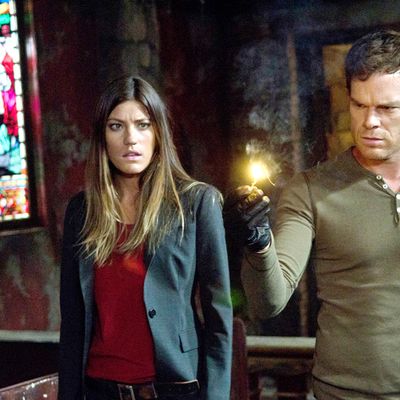
Woe was the Dexter fan, the one lured in by the lush nihilism of the show’s early seasons. The one who prefers the stories about Dexter lying to the stories of him striving. The one who’d rather watch a show about a gleeful sociopath than a repentant one, because if we wanted to watch a show about people resisting the urge to murder, we could just watch any other show. Pity the poor fan who endured last season’s incest story line, who sat through years of Rita’s scoldings, who wondered how long the show could spin its wheels. We wished for more aggressive storytelling, for smarter characters, for bigger choices, for more styles of suspense, for more credibility. You know, more like Homeland — another show about someone living a complete lie, someone who’s dangerous but hiding in plain sight, someone with a secret that can’t stay secret forever.
And this season, our wish came true.
This season of Dexter has neatly torn a page out of Homeland’s playbook, and it’s the best thing to happen to the show since the Ice Truck Killer. Deb knows now. Hallelujah!
Homeland’s fantastic first season hit a turning point halfway through, with the episode “The Weekend.” That’s the one where Carrie and Brody run off to a cabin together, and things turn from romance to interrogation pretty quickly. Most importantly, the big secrets we expected the show and characters to keep came spilling out. Yes, I’m spying on you, said Carrie. Yes, I converted to Islam, and I’ve met criminal mastermind Abu Nazir, said Brody. Homeland was suddenly culling dramatic value not just from tension but from the release of that tension: The central question of Carrie’s arc went from “She has to keep a secret!” to “Oh wow, what will happen after she tells her secret?”
That took Homeland seven episodes. It’s taken Dexter seven seasons. Dexter’s suspense generally relies on the audience knowing more than the characters. We know what’s in Dexter’s head — thanks, voice-overs! — but we also know what’s in his enemies’ heads, too, and what his co-workers think, and how the various investigations are going. The fun of the show is in the “Oh my god, will he get there in time?!” scenes, the “Don’t open that door!” kind of thrills. But the show’s biggest shocks have come in those rare instances when the characters know things we don’t — like when the Trinity Killer murdered Rita, which was as big a surprise to Dexter as it was to us.
Homeland’s approach is mostly the inverse of that. The characters all know at least a little bit more than we do — Brody certainly knows a lot more, and Carrie and Saul piece things together for audience edification. The huge dramatic moments have come when a character learns something we already knew: Dana finding out that her dad is a Muslim, and Saul realizing that Carrie was maybe right about some of Brody’s history.
That’s why Deb finally — finally, finally, finally — confronting the fact that her brother is a serial killer is such a jolt for the show: It opens up a lot of possibilities. Dexter can spend its final two seasons coping with secrets rather than just keeping them. Deb can be a little smarter, less of a dupe. Keeping things from people pushes them farther away (on TV and in life!); telling people things brings them in closer. Carrie and Brody might be on opposing teams, but their level of disclosure with one another bonds them in a way their sexual relationship (or investigator/investigatee relationship) never could. Now that Deb knows Dexter’s big horrible truth, she’s bound to him more tightly than ever, even as it makes her want to flee from him. Drama! A whole new kind of wonderful, interesting drama for Dexter, one that emphasizes character over circumstance. Now, if we could just make LaGuerta more like Saul, we’d really be in business.




